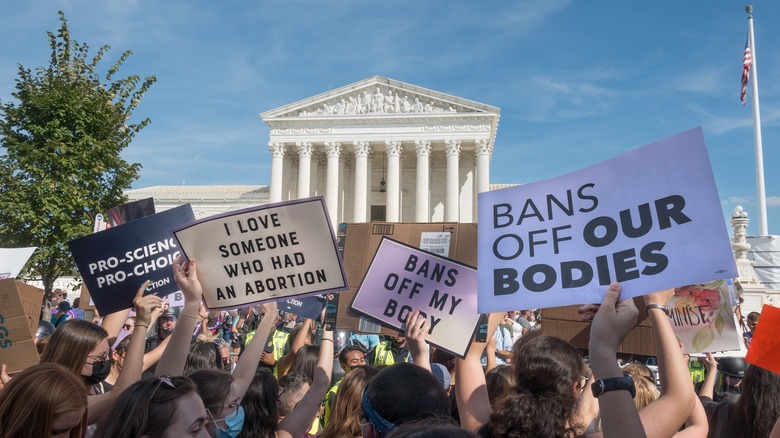What The Roe V. Wade Decision Could Mean For Reproductive Healthcare
In a 5-4 decision, the Supreme Court voted to overturn Roe v. Wade on Friday, June 24, thereby eliminating the constitutional right to obtain an abortion in the United States. Ruling in Dobbs v. Jackson Women's Health Organization, the Supreme Court effectively struck down federal abortion protections, giving each state the sole right to limit, ban, or expand abortion access (via CNBC). The decision also overruled Planned Parenthood v. Casey, which affirmed federal abortion rights granted by Roe v. Wade in 1973. It will allow states to pass sweeping restrictions.
The new decision will affect millions of people across the country, who may now need to travel to another state to obtain either a medical or surgical abortion. Many Americans will still have access to a safe and legal abortion, but where they are allowed to gain access to them and at what stage of pregnancy is subject to change.
What does this mean for you?
As a result of the Supreme Court's ruling, abortion laws can change quickly in at least 13 states. These states have trigger laws to ban or restrict abortion access, established to go into effect either immediately or within mere weeks of Roe v. Wade being overturned (via New York Times). These trigger states include Arkansas, Idaho, Kentucky, Louisiana, Mississippi, Missouri, North Dakota, Oklahoma, South Dakota, Tennessee, Texas, Utah, and Wyoming.
According to the Guttmacher Institute, abortion access might soon be restricted in many other states, including Florida, Nebraska, Montana, and Indiana, while states like Alabama, Arizona, Georgia, Iowa, Michigan, Ohio, South Carolina, West Virginia, and Wisconsin now have, or have previously had, restrictions in place (via Consumer Reports).
However, there are several places where abortion access is expected to remain legal, including Alaska, California, Colorado, Connecticut, Delaware, Hawaii, Illinois, Maine, Maryland, Massachusetts, Minnesota, Nevada, New Jersey, New York, Oregon, Rhode Island, Vermont, Washington, and Washington, D.C.
If you live in a state where abortion is expected to be banned, it is currently legal for you to cross state lines and obtain an abortion in another state. You might also be able to order an abortion pill from a healthcare provider online to terminate a pregnancy up to 11 weeks of gestation. However, this is already illegal in some states.
Because of Friday's ruling, there is much that is now uncertain. If you have questions about your options, talk to a doctor or healthcare professional.


